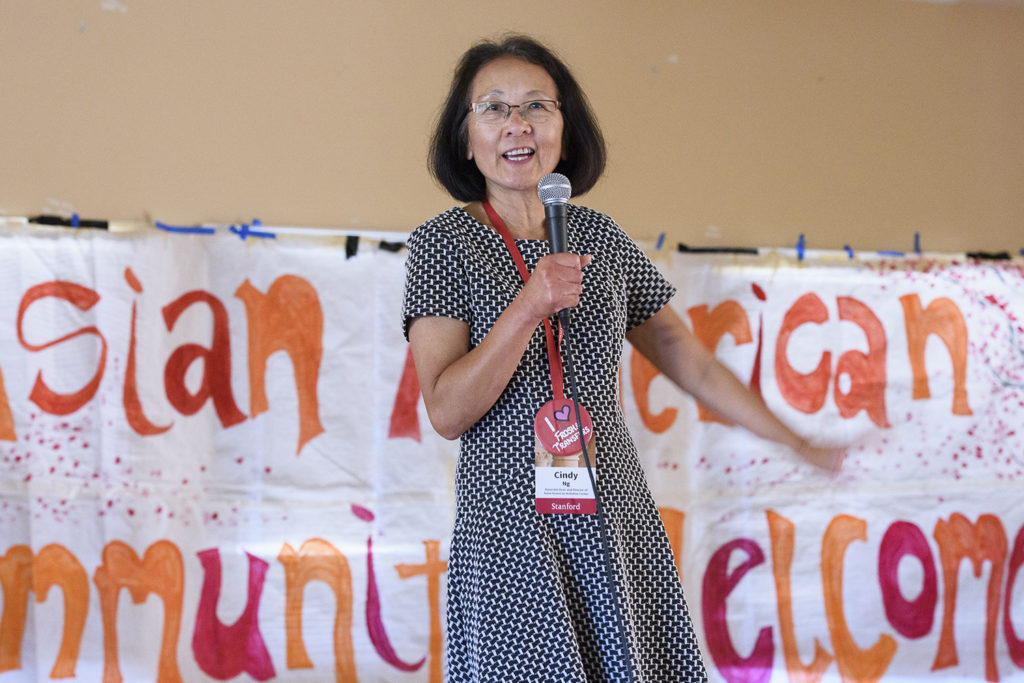Cindy Ng, a pillar of Stanford’s Asian American community, wins a 2020 Amy J. Blue Award
Cindy Ng, the Scott J.J. Hsu Director of the Asian American Activities Center, will receive an Amy J. Blue Award on Feb. 11. The award honors staff members who are exceptionally dedicated, supportive of colleagues and passionate about their work.
After earning a bachelor’s degree in theoretical mathematics in 1973, Cindy Ng knocked on the back door of a garment factory in San Francisco and asked for a job.
At the time, Ng was working with the Chinese Progressive Association, which had launched initiatives to improve pay and working conditions for Chinese immigrants employed in the city’s restaurants and garment factories.
Ng, the Scott J.J. Hsu Director of the Asian American Activities Center (A³C) at Stanford, said she learned the value of work at the factory, where she helped Chinese-speaking seamstresses receive payment for each task they completed, as required under their union contract.
“They worked really hard and did not complain about the work, but they did want to be paid fairly,” said Ng, a 2020 recipient of an Amy J. Blue Award, which honors staff members who are exceptionally dedicated, supportive of colleagues and passionate about their work.
It was the beginning of a long career devoted to organizing in Asian American and Asian immigrant communities, including a 15-year stint in New York City’s Chinatown, where Ng built support for the 1984 presidential campaign of Rev. Jesse Jackson, the first candidate to visit Chinatown and to include Asian American issues on his platform.
In 1991, Ng returned to the Bay Area and became the program coordinator at Stanford’s Asian American Activities Center, where her “communities” became the university’s ever-changing population of Asian American students. The center helps students build community, establish mentorships with peers, alumni and faculty, and find the academic, cultural and social resources to thrive on campus and beyond.
“Cindy is the ‘mother’ that you want your child to have at college, and the mentor, friend and colleague you want to have at work,” said Jeanne Tsai, a professor of psychology and faculty director of Asian American Studies at Stanford. “She is a trusted colleague and adviser to many of us on campus, because she is wise, kind, warm and compassionate, and because she is fiercely dedicated to supporting faculty, students and staff.”
One of three Amy J. Blue Award winners
Ng is one of three Stanford employees who were recently named 2020 Amy J. Blue Award winners. The other recipients are Arthel D. Coleman, Jr., manager of student residential services at the GSB Residences, and Joel Gonzalez, a media technician in Event Services.
The winners will be honored in an online celebration at 3:00 p.m. on Thursday, Feb. 11. Elizabeth Zacharias, vice president for human resources, will be the featured speaker. The link to the Zoom meeting is here. This year’s winners will also be invited to attend an in-person ceremony – likely to be held in the fall – that will also honor the 2021 cohort.
A safe haven and a springboard
Alumni who nominated Ng for the award remembered the welcoming and supportive environment she fostered in the A³C, which is located on the historic Old Union Clubhouse.
“She encouraged my friends and me to become more active and involved with our campus and our community, and to join and start organizations,” said Eric Shih, ’05. “When we had ambitious ideas for conferences or events, she was always so positive that we got over our doubts and pulled them off. She suggested people in the administration we could talk to for fundraising and she made connections to speakers and attendees. She showed up to our events, even when they were on the weekends.”
Linda Lee, ’07, said she experienced a deep sense of isolation when she arrived on campus and discovered she was the sole Hmong-American in the undergraduate population. Those feelings began to dissipate when she hung out with her Asian American Big Sib and co-sibs at the center and met Ng, who encouraged her to apply to a student leadership program.
“Cindy helped me build community, taught me how to support and develop other people’s leadership and how to see beyond the traditional markers of leadership,” said Lee, who helped establish the Stanford Hmong Student Union. “She also encouraged me to dive deeply into the Stanford community, sit on university committees, apply for fellowships and connect with communities on and off campus. I use the skills she taught me every day.”
Anh Truong, ’14, the center’s graduate student in residence for undergraduate research support, said Ng is constantly brainstorming ways to help students, especially those from disadvantaged backgrounds, get the most out of their time at Stanford.
“Cindy ’s ideas always start by examining the problems students face and then figuring out ways to support them through their struggles,” Truong said. “She incorporates this feedback by improving existing programs or creating new ones to reach even more students who may be having similar experiences.”
Reaching students wherever they are
During the pandemic, Ng and her team, including the assistant and associate director, and 23 student staff members, have been taking turns “taking over” the A³C Instagram account to share what they’re doing that day, and to answer questions, such as what’s your favorite food? Ng’s answer? Salted fish fried rice.
She said the center’s Zoom gatherings – including an event focused on the PBS series, Asian Americans, and another focused on anti-Asian racism connected to COVID – have attracted a new group of students to the A³C. This week, the center is inviting students to share their experiences and concerns about virtual learning with supportive faculty and staff.
When she was asked to describe her favorite part of the job, Ng’s answer was simple.
“The students,” she said. “Absolutely the students.”
